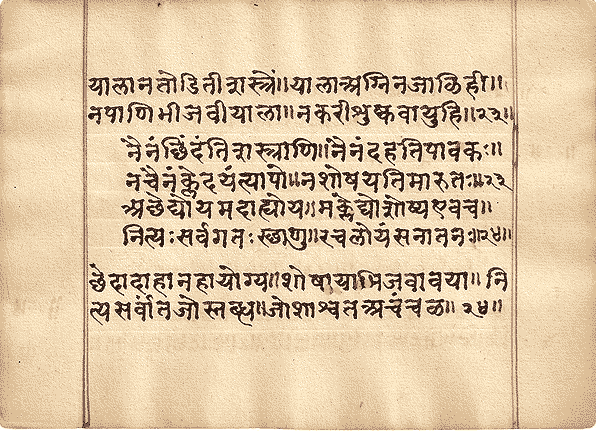
nainaṃ chindanti śastrāṇi nainaṃ dahati pāvakaḥ
na cainaṃ kledayanty āpo na śoṣayati mārutaḥ
Update RequiredTo play the media you will need to either update your browser to a recent version or update your Flash plugin.
śastrāṇi (weapons) enam (this) na chindanti (they do not cut),
pāvakaḥ (fire) enam (this) na dahati (it does not burn),
āpaḥ ca (and waters) enam (this) na kledayanti (they do not moisten),
mārutaḥ (wind) [
enam]
(this) na śoṣayati (it does not dry up).
| na |
– |
av. – not; |
| enam |
– |
etat sn. 2n.1 m. – this; |
| chindanti |
– |
√chid (to cut, to divide) Praes. P 1v.3 – they cut; |
| śastrāṇi |
– |
śastra 1n.3 n. – weapons which are handled (as opposed to weapon which is thrown – astra; from: √śas – to cut, to kill); |
| na |
– |
av. – not; |
| enam |
– |
etat sn. 2n.1 m. – this; |
| dahati |
– |
√dah (to burn) Praes. P 1v.1 – it burns; |
| pāvakaḥ |
– |
pāvaka 1n.1 m. – pure, fire (from: √pū – to purify); |
| na |
– |
av. – not; |
| ca |
– |
av. – and; |
| enam |
– |
etat sn. 2n.1 m. – this; |
| kledayanti |
– |
√klid (to be wet) Praes. caus. P 1v.3 – they cause to be wet, moisten; |
| āpaḥ |
– |
ap 1n.3 f. – waters (declined always in plural); |
| na |
– |
av. – not; |
| śoṣayati |
– |
√śuṣ (to dry up) Praes. caus. P 1v.1 – it causes to dry up; |
| mārutaḥ |
– |
māruta 1n.1 m. – wind, belonging to Maruta (marut – wind-god); |
kledayanty → kleśayanty (they torment);
The key:
an excerpt from the commented verse
quotes from the scriptures
starting polemic
|
Why is the Self quite changeless? The Lord says:
|
|
kasmāt avikriya eveti, āha – |
|
Him, weapons cut not; Him, fire burns not,
and Him, water wets not; Him, wind dries not.
|
|
nainaṃ chindanti śastrāṇi nainaṃ dahati pāvakaḥ |
na cainaṃ kledayanty āpo na śoṣayati mārutaḥ ||2.23|| |
|
Him, i. e., the embodied Self of whom we are speaking, weapons, such as swords, do not cut. As He has no parts, they can effect no division of Him into parts.
|
|
enaṃ prakṛtaṃ dehinaṃ na chindanti śastrāṇi, niravayavatvāt nāvayava-vibhāgaṃ kurvanti | śastrāṇi asy-ādīni | |
|
So, fire does not burn Him: even fire cannot reduce Him to ashes.
|
|
tathā nainaṃ dahati pāvakaḥ, agnir api na bhasmīkaroti | |
|
Neither does water wet Him; for, the power of water lies in disjoining the parts of a thing which is made up of parts, by wetting it; and this cannot take place in the partless Self.
|
|
tathā na cainaṃ kledayanti āpaḥ | apāṃ hi sāvayavasya vastuna ādrībhāva-karaṇena avayava-viśleṣāpādane sāmarthyam | tan na niravayave ātmani saṃbhavati | |
|
So, wind destroys an object containing moisture, by drying it up; but even wind cannot dry up the Self.
|
|
tathā snehavat dravyaṃ sneha-śoṣaṇena nāśayati vāyuḥ | enaṃ tv ātmānaṃ na śoṣayati māruto ’pi ||2.23|| |
commentary under the verse BhG 2.24
kathaṃ hantīti anena uktaṃ vadha-sādhanābhāvaṃ darśayann avināśitvam ātmanaḥ sphuṭīkaroti nainam ity ādi | āpo kledayanti mṛdu-karaṇena śithilaṃ na kurvanti | māruto ‚py enaṃ na śoṣayati
commentary under the verse BhG 2.24
na ca yuddhe tvayā prayuktebhyaḥ śastrāstrebhyaḥ kāpy ātmano vyathā sambhaved ity āha nainam iti | śastrāṇi khaḍgādīni | pāvaka āgneyāstram api yuṣmad-ādi-prayuktam | āpaḥ pārjanyāstram api | māruto vāyavyāstram
nanu śastra-pātaiḥ śarīra-vināśe tad-antaḥ-sthasyātmano vināśaḥ syāt gṛha-dāhe tan-madhya-sthasyaiva jantor iti cet tatrāha nainam iti | śastrāṇi khaḍgādīni | pāvaka āgneyāstram | āpaḥ pārjanyāstram api | māruto vāyavyāstram | tathā ca tat-prayuktaiḥ śastrāstrair nātmanaḥ kācid vyatheti

